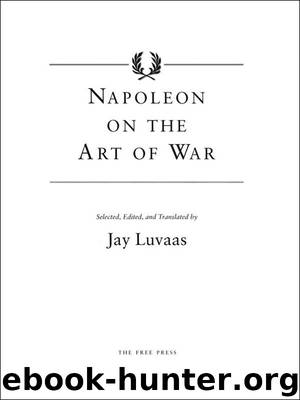NAPOLEON ON THE ART OF WAR by Unknown

Author:Unknown
Language: eng
Format: epub
Tags: Military History
Publisher: FREE PRESS
Published: 2001-07-15T00:00:00+00:00
Fortification
“It is evident that without fortifications a place cannot be considered secure unless held by considerably greater num bers than the enemy can bring to assail it. No less an author ity than Napoleon says that, aided by fortifications, 50,000 men and 3,000 artillery can defend a capital against 300,000 men, and he asserts the necessity of fortifying all national capitals.”
–BRIG. G EN. J OHN G. BARNARD, 22 J ANUARY 1862
It is necessary to determine the perception on the utility of fortified cities. There are fortified cities that defend a gorge and which, by that fact alone, have a fixed character. There are fortified cities that can contain large garrisons and resist for a long time, providing an inferior army has the means of being reinforced, reorganizing itself, and attempting new risks. In the first instance a fort or small town could be mentioned; in the second, a large fortified city, where one must spare neither money nor fortified works, is appropriate.
In addition to these two cases there is a third—the fortification of an entire frontier. Thus the frontier from Dunkerque to Mau beuge presents a large number of fortified towns of different sizes and importance, placed en échiquier in three lines so that it is physically impossible to pass on without having captured several of them. In this case a small fortified town has for its objective to support the flooding that runs from one city to the next, or to create a bottleneck. Then there is established, in the midst of all these fortified cities, a different kind of war. The capture of a convoy or the surprise of a magazine gives the advantage to a greatly inferior army without measuring swords or running any risk of having a siege raised or an operation fail. This is, in brief, the affair of Denain, a combat of little importance in itself, but one that nevertheless very clearly saved France from the greatest catastrophes. 1
Fortified towns are useful for defensive as well as offensive war. While they cannot in themselves take the place of an army, they constitute the only means one has to delay, check, weaken, or harass an enemy conquerer. Garrisons of fortified cities should be taken from the local population and not from active armies: regiments of provincial militia have this destination. It is the most lofty prerogative of the National Guard.
Perhaps Vauban’s system is defective, but it remains the best that has been offered. He would prefer to centralize, unite, gather his forces, his artillery, and his war machines than to scatter them. 2
Have the frontier fortresses of Flanders been useful or detrimental? To defend one’s capital, should an army cover it by retreating into it? Should it occupy an intrenched camp, supported by a fortified town, or should it maneuver freely so as not to allow itself to be driven into a corner, either in the capital or in a fortress?
The defense system of the frontier of Flanders in large measure has been conceived by Vauban, but this engineer was forced to utilize fortresses already in existence.
Download
This site does not store any files on its server. We only index and link to content provided by other sites. Please contact the content providers to delete copyright contents if any and email us, we'll remove relevant links or contents immediately.
Fanny Burney by Claire Harman(26603)
Empire of the Sikhs by Patwant Singh(23086)
Out of India by Michael Foss(16853)
Leonardo da Vinci by Walter Isaacson(13337)
Small Great Things by Jodi Picoult(7144)
The Six Wives Of Henry VIII (WOMEN IN HISTORY) by Fraser Antonia(5515)
The Wind in My Hair by Masih Alinejad(5095)
A Higher Loyalty: Truth, Lies, and Leadership by James Comey(4964)
The Crown by Robert Lacey(4817)
The Lonely City by Olivia Laing(4802)
Millionaire: The Philanderer, Gambler, and Duelist Who Invented Modern Finance by Janet Gleeson(4478)
The Iron Duke by The Iron Duke(4356)
Papillon (English) by Henri Charrière(4274)
Sticky Fingers by Joe Hagan(4200)
Joan of Arc by Mary Gordon(4113)
Alive: The Story of the Andes Survivors by Piers Paul Read(4033)
Stalin by Stephen Kotkin(3969)
Aleister Crowley: The Biography by Tobias Churton(3640)
Ants Among Elephants by Sujatha Gidla(3467)
